人教版(2019)必修第三册(Unit 1 Festivals and Celebrations Reading for Writing 课件共30张PPT)
文档属性
| 名称 | 人教版(2019)必修第三册(Unit 1 Festivals and Celebrations Reading for Writing 课件共30张PPT) |

|
|
| 格式 | pptx | ||
| 文件大小 | 14.2MB | ||
| 资源类型 | 教案 | ||
| 版本资源 | 人教版(2019) | ||
| 科目 | 英语 | ||
| 更新时间 | 2023-04-23 11:44:05 | ||
图片预览

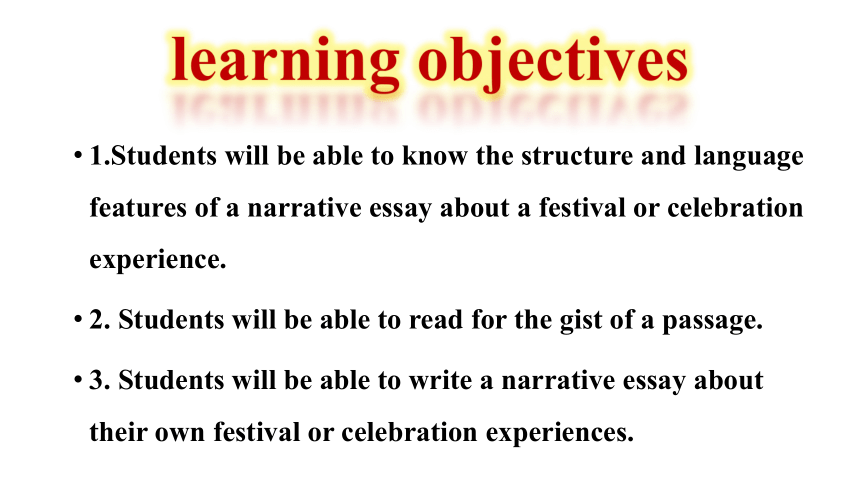
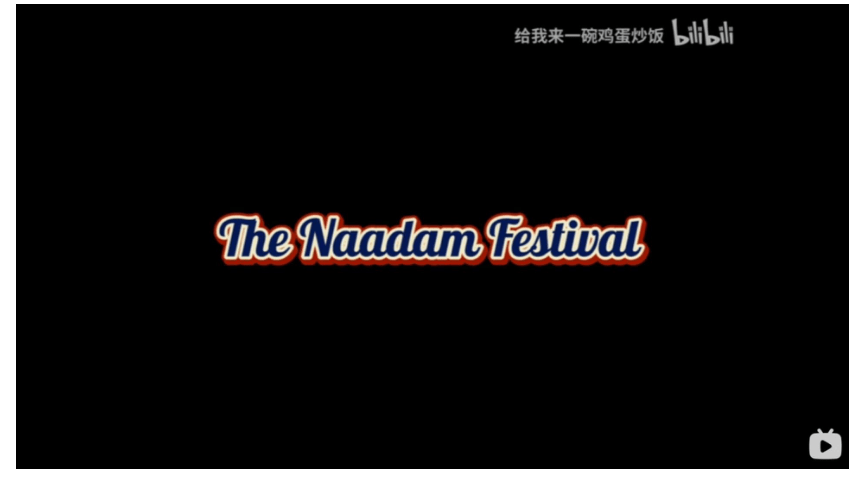
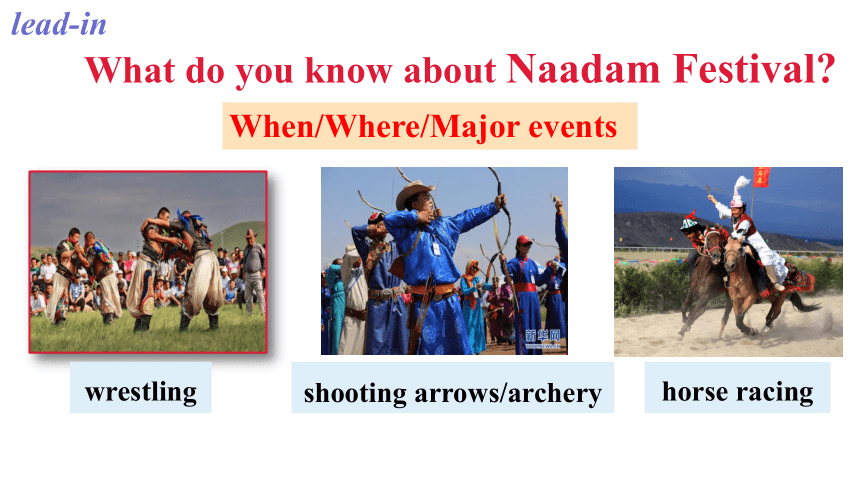
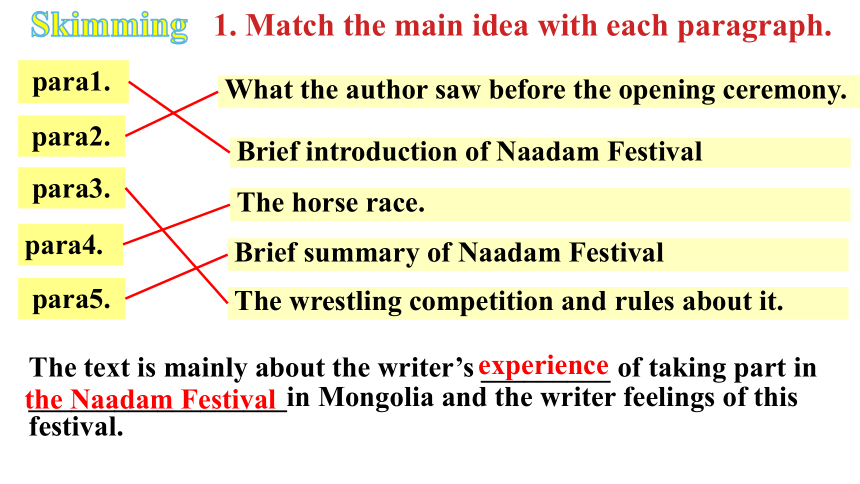
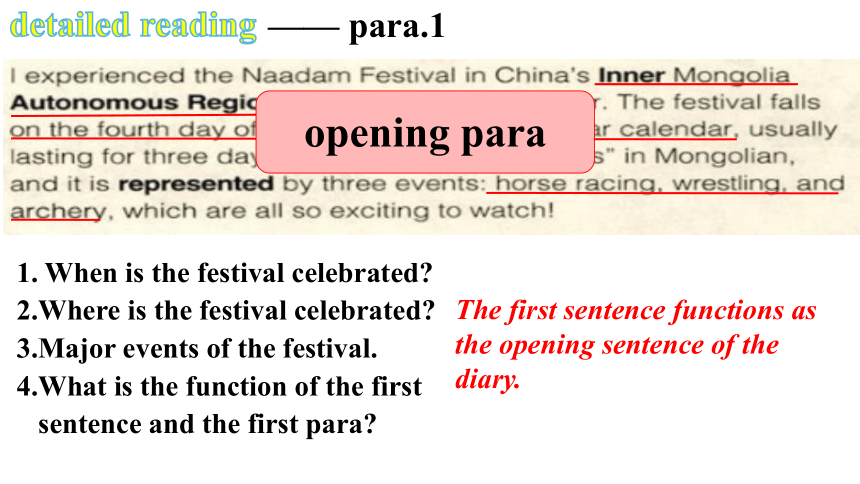
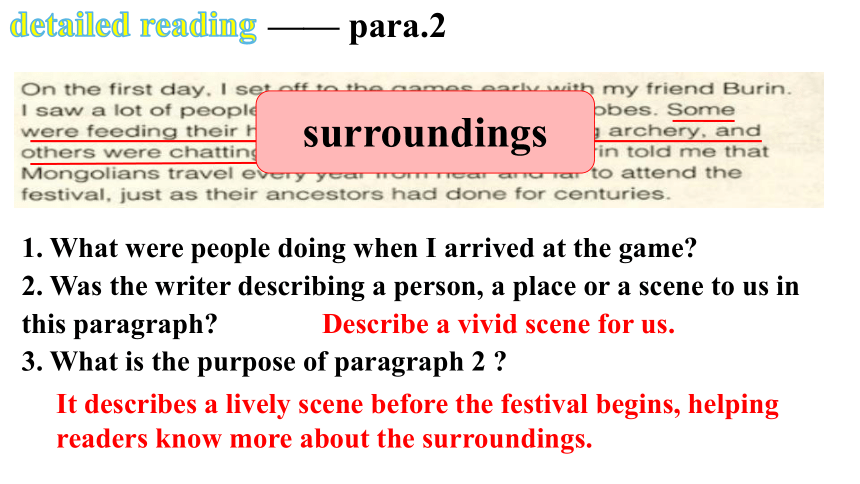
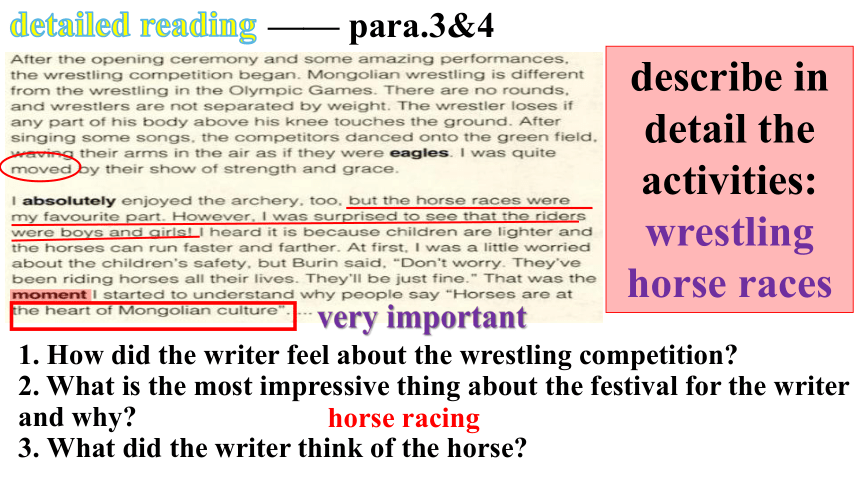
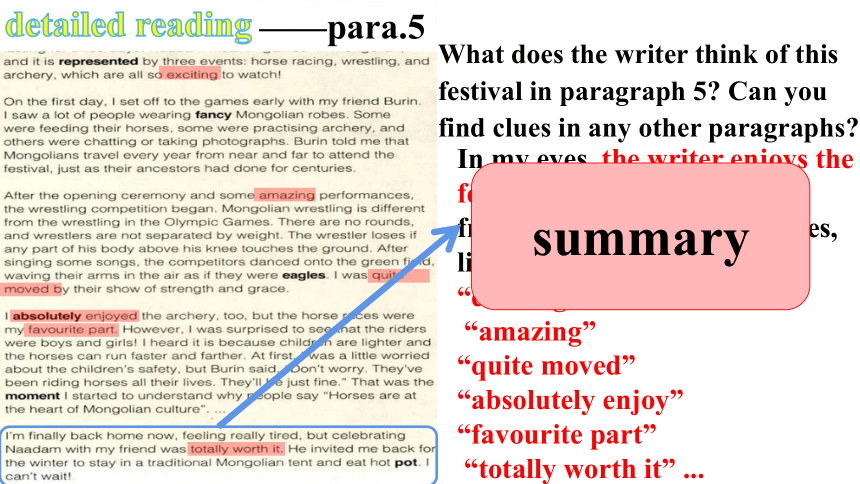
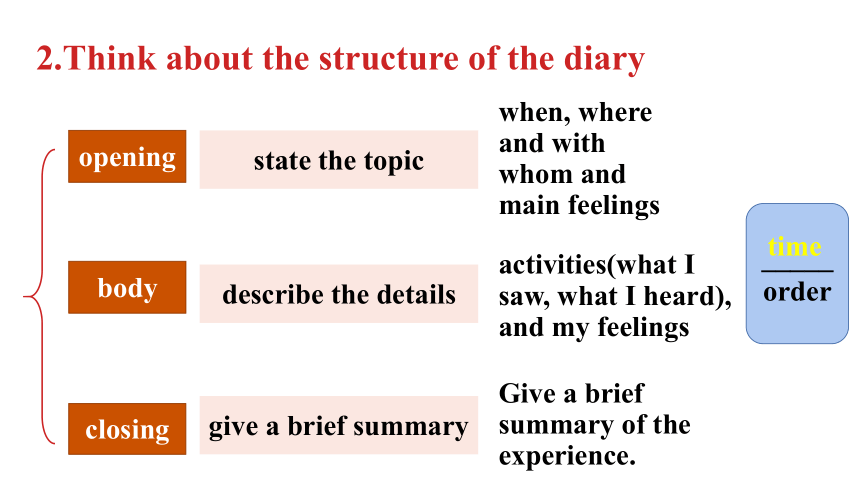
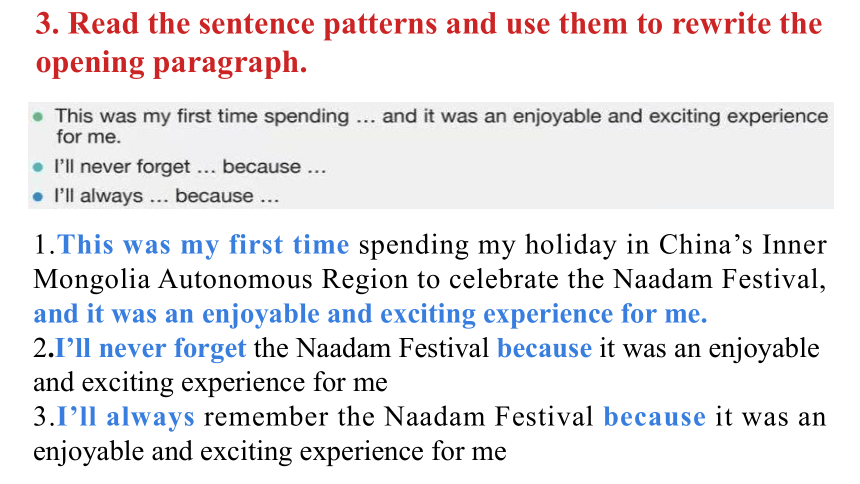
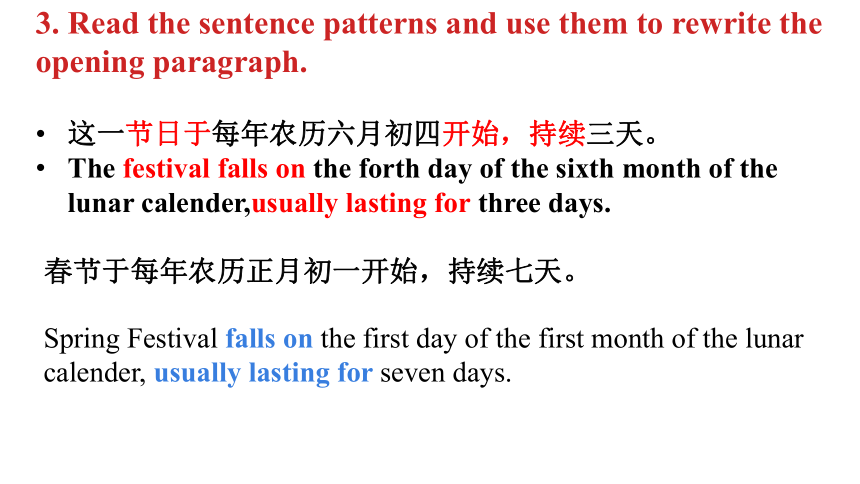
文档简介
(共30张PPT)
Unit 1
Festivals and Celebrations
Part 5-Reading for writing
1.Students will be able to know the structure and language features of a narrative essay about a festival or celebration experience.
2. Students will be able to read for the gist of a passage.
3. Students will be able to write a narrative essay about their own festival or celebration experiences.
learning objectives
When/Where/Major events
What do you know about Naadam Festival
shooting arrows/archery
horse racing
wrestling
lead-in
1. Match the main idea with each paragraph.
Brief introduction of Naadam Festival
What the author saw before the opening ceremony.
The wrestling competition and rules about it.
The horse race.
Brief summary of Naadam Festival
para1.
para2.
para3.
para4.
para5.
Skimming
The text is mainly about the writer’s _________ of taking part in __________________in Mongolia and the writer feelings of this festival.
the Naadam Festival
experience
1. When is the festival celebrated
2.Where is the festival celebrated
3.Major events of the festival.
4.What is the function of the first
sentence and the first para
The first sentence functions as the opening sentence of the diary.
opening para
detailed reading
—— para.1
1. What were people doing when I arrived at the game
2. Was the writer describing a person, a place or a scene to us in this paragraph
3. What is the purpose of paragraph 2
Describe a vivid scene for us.
It describes a lively scene before the festival begins, helping readers know more about the surroundings.
surroundings
detailed reading
—— para.2
1. How did the writer feel about the wrestling competition
2. What is the most impressive thing about the festival for the writer and why
3. What did the writer think of the horse
horse racing
describe in detail the activities:
wrestling horse races
very important
detailed reading
—— para.3&4
What does the writer think of this festival in paragraph 5 Can you find clues in any other paragraphs
In my eyes, the writer enjoys the festival very much. I can tell from the words the writer uses, like
“exciting”
“amazing”
“quite moved”
“absolutely enjoy”
“favourite part”
“totally worth it” ...
summary
——para.5
detailed reading
2.Think about the structure of the diary
opening
body
closing
state the topic
describe the details
give a brief summary
when, where and with whom and main feelings
activities(what I saw, what I heard), and my feelings
Give a brief summary of the experience.
_____order
time
3. Read the sentence patterns and use them to rewrite the opening paragraph.
1.This was my first time spending my holiday in China’s Inner Mongolia Autonomous Region to celebrate the Naadam Festival, and it was an enjoyable and exciting experience for me.
2.I’ll never forget the Naadam Festival because it was an enjoyable and exciting experience for me
3.I’ll always remember the Naadam Festival because it was an enjoyable and exciting experience for me
3. Read the sentence patterns and use them to rewrite the opening paragraph.
这一节日于每年农历六月初四开始,持续三天。
The festival falls on the forth day of the sixth month of the lunar calender,usually lasting for three days.
春节于每年农历正月初一开始,持续七天。
Spring Festival falls on the first day of the first month of the lunar calender, usually lasting for seven days.
3. Read the sentence patterns and use them to rewrite the opening paragraph.
我看到许多人身着华丽的蒙古袍。
I saw a lot of people wearing fancy Mongolian robes.
我看到许多人在公园赏月。
I saw a lot of people admiring the shining moon in the park.
这刚与柔的展示深深地打动了我。
I was quite moved by their show of strength and grace.
晚会上精彩的表演深深地打动了我。
I was quite moved by the wonderful performance at the evening party.
3. Read the sentence patterns and use them to rewrite the opening paragraph.
我顿时明白了为什么人们说“马是蒙古文化的核心”。
That was the moment I started to understand why people say “Horses are at the heart of Mongolian culture”.
我顿时明白了为什么人们说“团圆是中国人的信仰”。
That was the moment I started to understand why people say “Reunion is the belief of the Chinese people”.
3. Read the sentence patterns and use them to rewrite the opening paragraph.
(那达慕大会)它主要有三大赛事:赛马,摔跤和射箭,每项运动都动人心魄。
It (The Naadam Festival) is represented by three events: horse racing, wrestling, and archery, which are all so exciting to watch!
元宵节(Lantern Festival)主要有三项活动:赏花灯,舞狮子,猜灯谜,每项运动都十分有趣。
The Lantern Festival is represented by three events: watching lanterns, performing Lion Dance, and guessing lantern riddles, which are all interesting!
4.underline the sentences that describe the writer’s feelings and emotions.
...and archery, which are all so wxciting to watch
some amazing perfomances
I was surprised to see...
I was a little worried about...
feeling really tired
I can’ wait!
...was totally worth it
Talk about your festival experience with your partners and fill in the blanks.
pre-writing
你校英语报 Festival 栏目正面向全校学生征稿,请你用英语写一篇短文,介绍你的一次节日经历,并投稿。
注意:1.词数80左右;
2.可以适当增加细节,以使行文连贯
写作指导
一、审题定调
本写作任务要求介绍自己的一次节日经历,属于_______。在介绍节日经历时,可以按照_________ 展开叙述。
二、谋篇布局
本写作可以分为三部分:
第一部分:说明节日名称并简单介绍;
第二部分:具体叙述节日的准备活动和庆祝活动;
第三部分:总结节日经历并表明自己的感受。
记叙文
时间顺序
while-writing
本单元的写作任务是写一篇节日活动类记叙文。该类作文以叙述事件为主,要通过完整的故事情节和生动形象的语言,使读者在享受故事情节的同时有所感悟。写作时要注意交代清楚记叙文的六要素:时间、地点、人物、事件的起因、经过、结果。
一、基本结构
1、开头——交代清楚事件的背景。
2、主体——主要叙述事件的起因、经过及结果。
3、结尾——呼应标题,发表感想、愿望等。
二、注意事项
1、标题:若有标题,标题一定要明确,能点明事件或主题。
2、人称:通常用第一人称和第三人称。
3、时态:在叙事过程中一般用过去时态。在描写背景或某景象时,常用过去进行时,这样显得更加生动形象。
Tip
useful expressions
Spring Festival 春节 Tomb-sweeping Festival 清明节
Lantern Festival 元宵节 Dragon Boat Festival 端午节
Mid-Autumn Festival中秋节 Lunar New Year’s Eve 除夕
Festivals
Lunar New Year's dinner 年夜饭
Spring Festival Gala 春晚
a thorough cleaning 大扫除
Spring Festival couplets春联
set off fireworks 放烟花
watch lanterns 赏灯
guess lantern riddles 猜灯谜
Dragon Boat racing 赛龙舟
rice dumplings 粽子
mooncakes 月饼
have a get-together 聚会
pay a visit to sb. 拜访某人
be busy doing 忙于……
activities
1. The festival falls on the … day of ...
2. This was my first time spending ... and it was an enjoyable and exciting experience for me.
3. I will never forget ... because ...
4. I was quite moved by ...
5. That was the moment ... why ...
6. It is a festival that makes us reunite.
useful expressions
A festival experience:
Part 1. (Opening )
________Festival, which is one of the most important traditional festivals in China, falls on ______. It is a great time for us to __________.
Part 2. (Body)
I remember celebrating _______ with ____ this/ last year. We enjoyed a lot of activities. ____ (time), _____________(activity one). _____(time), _______ (activity two). _____ (time), _______(activity three).
Part 3 (Closing)
It was a really _______ festival experience. The festival experience made me realize ______ .
write down your festival experience using what you learned in this class
post-writing
The Mid-Autumn Festival, which is one of the most popular traditional festivals in China, falls on the fifteenth day of the eighth month of the lunar calender. It is a great time for families to get together.
I still remember my family celebrating the Mid-Autumn Festival last year. During the day, we prepared all the dishes for a great feast and bought several types of mooncakes. As darkness fell, all my family enjoyed the delicious mooncakes, various fruits and other tasty food while admiring the shining moon. Over dinner, we talked about what was going on with us recently.
It was a really joyful festival experience.The festival experience made me realize the importance of family and inspired me to spend more time with my family.
1 Inner Mongolia Autonomous Region
2 set off
3 from near and far
4 attend the festival
5 opening / closing ceremony
6 separate ... by weight
7 be worth it
8 invite sb back for the winter
9 eat hot pot
10 can’t wait (to do sth)
11 in detail
出发;开始;点燃
从各处
参加节日
开幕式 / 闭幕式
按重量分组
值得
内蒙古自治区
吃火锅
等不及(做某事)
详细地
邀请某人回来过冬天
Reading for language points
1. That was the moment I started to understand why people say “Horses are at the heart of Mongolian culture”. (P8) 我顿时明白了为什么人们说“马是蒙古文化的核心”了。
Recall and retell
the minute, the second, the instant
必修一 Unit 1 我们已经了解:
the first time, (the) last time, every time, each time;
the moment, the minute, the second, the day, the year, the autumn / the instant; immediately, directly, instantly
(一……就……)
时间名词短语或副词用作从属连词,引导时间状语从句。
切记:此类词或短语后直接跟句子。
Reading for language points
2. I’m finally back home now, feeling really tired, but celebrating Naadam with my friend was totally worth it. He invited me back for the winter to stay in a traditional Mongolian tent and eat hot pot. (P8) 我现在已经回到家了,感到十分疲倦,但能和我的朋友一起庆祝那达慕,再累也是值得的。
worth 后加代词
【句式分析】1. 句中,feeling ... 作________, celebrating ... 作_______。
【拓展1】
1. It was worth five hundred francs at most.
2. The question is not worth discussing again and again.
3. What’s the worth of the old painting
伴随状语
主语
worth 后接价钱
worth 后接doing表示被动
worth 作名词,意为“价钱”
Reading for language points
一句多译搞懂 worth, worthy & worthwhile
翻译:他值得等待。
He is worth waiting for.
He is worthy to be waited for.
He is worthy of being waited for.
It is worthwhile waiting for him.
It is worthwhile to wait for him.
It is worth our while to wait for him.
Reading for language points
Thanks for your attention!
Homework
Polish your writing based on what you have learned and the vocabulary and expressions you have acquired.
Thank you
Unit 1
Festivals and Celebrations
Part 5-Reading for writing
1.Students will be able to know the structure and language features of a narrative essay about a festival or celebration experience.
2. Students will be able to read for the gist of a passage.
3. Students will be able to write a narrative essay about their own festival or celebration experiences.
learning objectives
When/Where/Major events
What do you know about Naadam Festival
shooting arrows/archery
horse racing
wrestling
lead-in
1. Match the main idea with each paragraph.
Brief introduction of Naadam Festival
What the author saw before the opening ceremony.
The wrestling competition and rules about it.
The horse race.
Brief summary of Naadam Festival
para1.
para2.
para3.
para4.
para5.
Skimming
The text is mainly about the writer’s _________ of taking part in __________________in Mongolia and the writer feelings of this festival.
the Naadam Festival
experience
1. When is the festival celebrated
2.Where is the festival celebrated
3.Major events of the festival.
4.What is the function of the first
sentence and the first para
The first sentence functions as the opening sentence of the diary.
opening para
detailed reading
—— para.1
1. What were people doing when I arrived at the game
2. Was the writer describing a person, a place or a scene to us in this paragraph
3. What is the purpose of paragraph 2
Describe a vivid scene for us.
It describes a lively scene before the festival begins, helping readers know more about the surroundings.
surroundings
detailed reading
—— para.2
1. How did the writer feel about the wrestling competition
2. What is the most impressive thing about the festival for the writer and why
3. What did the writer think of the horse
horse racing
describe in detail the activities:
wrestling horse races
very important
detailed reading
—— para.3&4
What does the writer think of this festival in paragraph 5 Can you find clues in any other paragraphs
In my eyes, the writer enjoys the festival very much. I can tell from the words the writer uses, like
“exciting”
“amazing”
“quite moved”
“absolutely enjoy”
“favourite part”
“totally worth it” ...
summary
——para.5
detailed reading
2.Think about the structure of the diary
opening
body
closing
state the topic
describe the details
give a brief summary
when, where and with whom and main feelings
activities(what I saw, what I heard), and my feelings
Give a brief summary of the experience.
_____order
time
3. Read the sentence patterns and use them to rewrite the opening paragraph.
1.This was my first time spending my holiday in China’s Inner Mongolia Autonomous Region to celebrate the Naadam Festival, and it was an enjoyable and exciting experience for me.
2.I’ll never forget the Naadam Festival because it was an enjoyable and exciting experience for me
3.I’ll always remember the Naadam Festival because it was an enjoyable and exciting experience for me
3. Read the sentence patterns and use them to rewrite the opening paragraph.
这一节日于每年农历六月初四开始,持续三天。
The festival falls on the forth day of the sixth month of the lunar calender,usually lasting for three days.
春节于每年农历正月初一开始,持续七天。
Spring Festival falls on the first day of the first month of the lunar calender, usually lasting for seven days.
3. Read the sentence patterns and use them to rewrite the opening paragraph.
我看到许多人身着华丽的蒙古袍。
I saw a lot of people wearing fancy Mongolian robes.
我看到许多人在公园赏月。
I saw a lot of people admiring the shining moon in the park.
这刚与柔的展示深深地打动了我。
I was quite moved by their show of strength and grace.
晚会上精彩的表演深深地打动了我。
I was quite moved by the wonderful performance at the evening party.
3. Read the sentence patterns and use them to rewrite the opening paragraph.
我顿时明白了为什么人们说“马是蒙古文化的核心”。
That was the moment I started to understand why people say “Horses are at the heart of Mongolian culture”.
我顿时明白了为什么人们说“团圆是中国人的信仰”。
That was the moment I started to understand why people say “Reunion is the belief of the Chinese people”.
3. Read the sentence patterns and use them to rewrite the opening paragraph.
(那达慕大会)它主要有三大赛事:赛马,摔跤和射箭,每项运动都动人心魄。
It (The Naadam Festival) is represented by three events: horse racing, wrestling, and archery, which are all so exciting to watch!
元宵节(Lantern Festival)主要有三项活动:赏花灯,舞狮子,猜灯谜,每项运动都十分有趣。
The Lantern Festival is represented by three events: watching lanterns, performing Lion Dance, and guessing lantern riddles, which are all interesting!
4.underline the sentences that describe the writer’s feelings and emotions.
...and archery, which are all so wxciting to watch
some amazing perfomances
I was surprised to see...
I was a little worried about...
feeling really tired
I can’ wait!
...was totally worth it
Talk about your festival experience with your partners and fill in the blanks.
pre-writing
你校英语报 Festival 栏目正面向全校学生征稿,请你用英语写一篇短文,介绍你的一次节日经历,并投稿。
注意:1.词数80左右;
2.可以适当增加细节,以使行文连贯
写作指导
一、审题定调
本写作任务要求介绍自己的一次节日经历,属于_______。在介绍节日经历时,可以按照_________ 展开叙述。
二、谋篇布局
本写作可以分为三部分:
第一部分:说明节日名称并简单介绍;
第二部分:具体叙述节日的准备活动和庆祝活动;
第三部分:总结节日经历并表明自己的感受。
记叙文
时间顺序
while-writing
本单元的写作任务是写一篇节日活动类记叙文。该类作文以叙述事件为主,要通过完整的故事情节和生动形象的语言,使读者在享受故事情节的同时有所感悟。写作时要注意交代清楚记叙文的六要素:时间、地点、人物、事件的起因、经过、结果。
一、基本结构
1、开头——交代清楚事件的背景。
2、主体——主要叙述事件的起因、经过及结果。
3、结尾——呼应标题,发表感想、愿望等。
二、注意事项
1、标题:若有标题,标题一定要明确,能点明事件或主题。
2、人称:通常用第一人称和第三人称。
3、时态:在叙事过程中一般用过去时态。在描写背景或某景象时,常用过去进行时,这样显得更加生动形象。
Tip
useful expressions
Spring Festival 春节 Tomb-sweeping Festival 清明节
Lantern Festival 元宵节 Dragon Boat Festival 端午节
Mid-Autumn Festival中秋节 Lunar New Year’s Eve 除夕
Festivals
Lunar New Year's dinner 年夜饭
Spring Festival Gala 春晚
a thorough cleaning 大扫除
Spring Festival couplets春联
set off fireworks 放烟花
watch lanterns 赏灯
guess lantern riddles 猜灯谜
Dragon Boat racing 赛龙舟
rice dumplings 粽子
mooncakes 月饼
have a get-together 聚会
pay a visit to sb. 拜访某人
be busy doing 忙于……
activities
1. The festival falls on the … day of ...
2. This was my first time spending ... and it was an enjoyable and exciting experience for me.
3. I will never forget ... because ...
4. I was quite moved by ...
5. That was the moment ... why ...
6. It is a festival that makes us reunite.
useful expressions
A festival experience:
Part 1. (Opening )
________Festival, which is one of the most important traditional festivals in China, falls on ______. It is a great time for us to __________.
Part 2. (Body)
I remember celebrating _______ with ____ this/ last year. We enjoyed a lot of activities. ____ (time), _____________(activity one). _____(time), _______ (activity two). _____ (time), _______(activity three).
Part 3 (Closing)
It was a really _______ festival experience. The festival experience made me realize ______ .
write down your festival experience using what you learned in this class
post-writing
The Mid-Autumn Festival, which is one of the most popular traditional festivals in China, falls on the fifteenth day of the eighth month of the lunar calender. It is a great time for families to get together.
I still remember my family celebrating the Mid-Autumn Festival last year. During the day, we prepared all the dishes for a great feast and bought several types of mooncakes. As darkness fell, all my family enjoyed the delicious mooncakes, various fruits and other tasty food while admiring the shining moon. Over dinner, we talked about what was going on with us recently.
It was a really joyful festival experience.The festival experience made me realize the importance of family and inspired me to spend more time with my family.
1 Inner Mongolia Autonomous Region
2 set off
3 from near and far
4 attend the festival
5 opening / closing ceremony
6 separate ... by weight
7 be worth it
8 invite sb back for the winter
9 eat hot pot
10 can’t wait (to do sth)
11 in detail
出发;开始;点燃
从各处
参加节日
开幕式 / 闭幕式
按重量分组
值得
内蒙古自治区
吃火锅
等不及(做某事)
详细地
邀请某人回来过冬天
Reading for language points
1. That was the moment I started to understand why people say “Horses are at the heart of Mongolian culture”. (P8) 我顿时明白了为什么人们说“马是蒙古文化的核心”了。
Recall and retell
the minute, the second, the instant
必修一 Unit 1 我们已经了解:
the first time, (the) last time, every time, each time;
the moment, the minute, the second, the day, the year, the autumn / the instant; immediately, directly, instantly
(一……就……)
时间名词短语或副词用作从属连词,引导时间状语从句。
切记:此类词或短语后直接跟句子。
Reading for language points
2. I’m finally back home now, feeling really tired, but celebrating Naadam with my friend was totally worth it. He invited me back for the winter to stay in a traditional Mongolian tent and eat hot pot. (P8) 我现在已经回到家了,感到十分疲倦,但能和我的朋友一起庆祝那达慕,再累也是值得的。
worth 后加代词
【句式分析】1. 句中,feeling ... 作________, celebrating ... 作_______。
【拓展1】
1. It was worth five hundred francs at most.
2. The question is not worth discussing again and again.
3. What’s the worth of the old painting
伴随状语
主语
worth 后接价钱
worth 后接doing表示被动
worth 作名词,意为“价钱”
Reading for language points
一句多译搞懂 worth, worthy & worthwhile
翻译:他值得等待。
He is worth waiting for.
He is worthy to be waited for.
He is worthy of being waited for.
It is worthwhile waiting for him.
It is worthwhile to wait for him.
It is worth our while to wait for him.
Reading for language points
Thanks for your attention!
Homework
Polish your writing based on what you have learned and the vocabulary and expressions you have acquired.
Thank you
